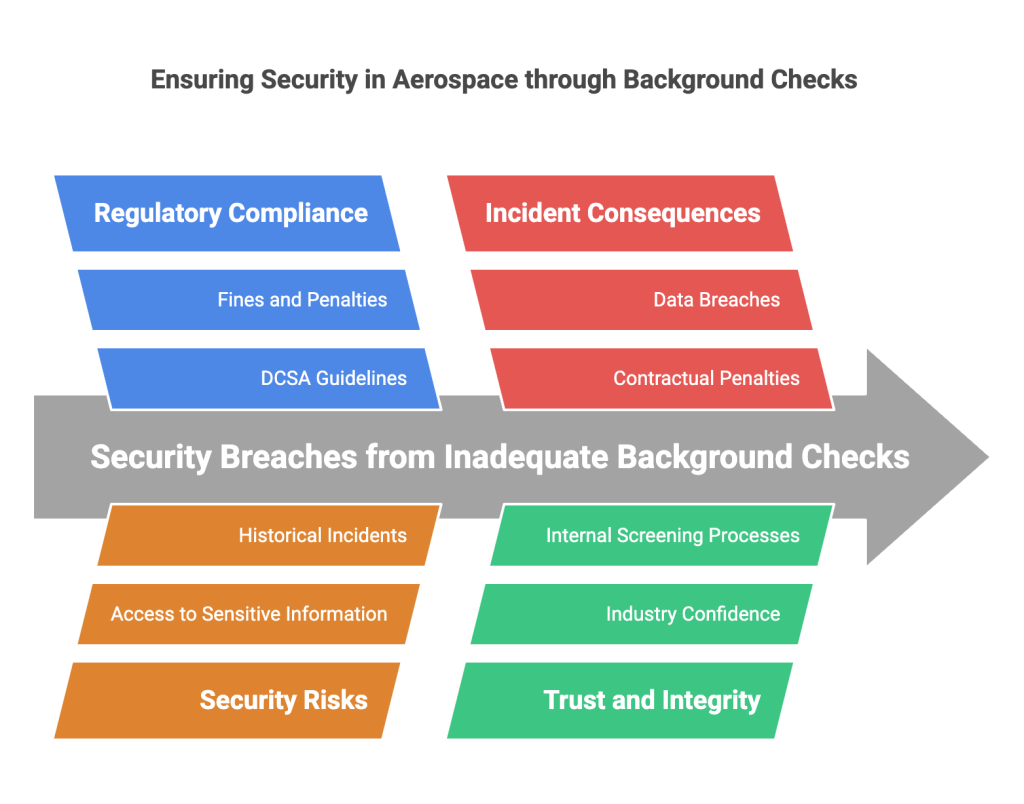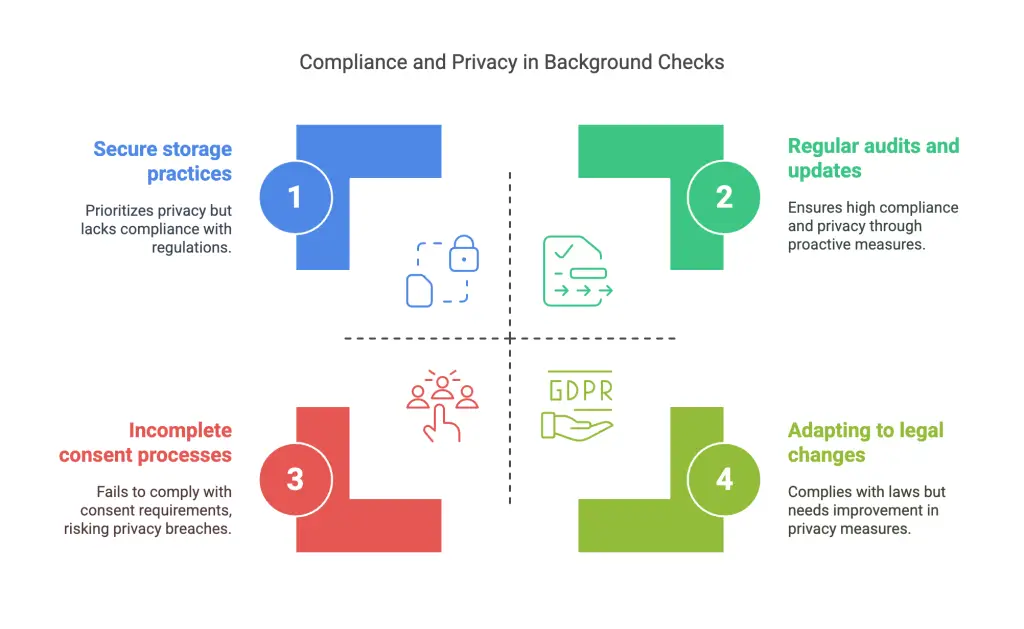The aerospace industry in Arizona is booming. With cutting-edge developments in defense technology and a surge in demand for skilled professionals, the focus on compliance, particularly in background checks, is sharper than ever. This guide provides a detailed overview of Arizona aerospace background checks and the standards defense contractors must meet. From understanding ITAR compliance to navigating contractor screenings, we've got you covered with everything you need to know.
Key Takeaways
- Arizona's aerospace industry is rapidly growing due to advancements in defense technology and the need for skilled workers.
- Background checks are essential to ensure that only trustworthy individuals participate in defense-related activities.
- High-profile companies like Raytheon and Honeywell are central to Arizona's aerospace sector, contributing significantly to the state's economy
- Defense contractor screenings in Arizona include checks on criminal history, employment, education, and drug tests to ensure compliance and reduce risks.
- Familiarity with ITAR regulations is crucial for aerospace companies to avoid severe penalties and ensure the security of defense-related operations.
Introduction
Arizona's aerospace industry is expanding rapidly, driven by advancements in defense technology and a growing need for skilled professionals. This growth places a spotlight on compliance checks, which ensure that only qualified, trustworthy individuals take part in defense-related activities. Background checks play a crucial role in safeguarding national security and maintaining the operational integrity of these endeavors. They help ensure that the individuals behind the controls are not only capable but also trustworthy.
Why are these background checks so important? They help prevent threats before they arise. In an industry where security breaches could have national or even global consequences, thorough screenings are essential. The stakes are high, and the regulations are stringent. Aerospace companies must adhere to strict protocols to meet both legal and ethical standards.
This article digs into the intricacies of Arizona aerospace background checks, with a focus on defense contractor compliance and ITAR regulations. It provides insights into how these checks are conducted, the challenges faced, and why they're indispensable for the sectorâs integrity.
Overview of the Arizona Aerospace Industry
Arizona's aerospace industry is rapidly expanding, driven by innovation and increased defense contracts. As of recent years, the industry has seen a significant rise in output, contributing billions to the state's economy. According to the Arizona Commerce Authority, aerospace and defense manufacturing have become key sectors, employing thousands of residents and attracting top-tier talent. Major cities like Phoenix and Tucson are becoming central hubs for cutting-edge aerospace technology and operations.
Several high-profile companies are establishing or expanding their operations in Arizona. Among them, Raytheon Missiles & Defense stands out as a significant player, providing advanced technology solutions. Honeywell Aerospace also maintains a strong presence, focusing on developing engines and aviation technology. These companies, alongside others like Boeing and Northrop Grumman, help position Arizona as a leader in defense and aerospace.
The economic contribution of the aerospace industry in Arizona cannot be understated. It not only provides high-paying jobs but also fosters secondary industries and services. For instance, research institutions and engineering firms have grown around these companies, creating a robust ecosystem. This has led to improved infrastructure, educational opportunities, and overall economic growth.
Given the booming industry, specialists and contractors must navigate complex compliance checks to align with national security standards. Comprehending these regulations is crucial for maintaining Arizona's trajectory as a pivotal aerospace leader. Are you prepared to meet these challenges and seize the opportunities in this dynamic landscape?
Importance of Background Checks in Aerospace
Background checks play a pivotal role in the aerospace industry, especially for defense contractors. With national security at the forefront, these checks are not just a formality; they're crucial in maintaining a secure and trustworthy environment. Imagine a scenario where an unqualified individual gains access to sensitive defense operations. The risk isn't just theoreticalâhistory has seen numerous close calls when screening was lax.
Regulatory compliance mandates rigorous background checks. In the aerospace sector, they're non-negotiable. The Defense Counterintelligence and Security Agency (DCSA) sets strict guidelines for vetting personnel. Without compliance, companies face fines, operational delays, and, in severe cases, a complete halt to their contracts. These checks cover criminal history, work credentials, and even social media activity.
Take the case of a major defense contractor that overlooked proper checks. A new hire with an undisclosed criminal background accessed classified information, resulting in a serious data breach. This incident underscores how critical it is to thoroughly vet individuals before granting facility access.

When you think about your own screening processes, are they thorough enough? Are you confident in the integrity of your hires? Effective background checks not only protect but also build trust within the industry. It's a small price to pay for securing our skies and keeping sensitive information out of reach.
AZ Defense Contractor Screening
When it comes to screening defense contractors in Arizona, several key components must align seamlessly to ensure compliance and security. The goal is to minimize risks and uphold the integrity of defense operations. Here's what a typical screening process involves:
Criminal History Assessments
Criminal background checks top the list. These assessments focus on identifying past offenses that could pose security threats. A thorough review involves federal, state, and local databases. Any red flags need a closer look to evaluate their relevance to the position and overall risk.
Employment Verification
Verification of past employment is more than just a resume check. It ensures candidates have the experience they claim. Employers verify job titles, durations, and responsibilities. In defense contracts, confirming previous roles related to security or technology is crucial. Missing or inconsistent details can signal deeper issues.
Education Credentials
Accurate verification of educational achievements is essential. Incorrect or exaggerated claims about degrees can indicate a pattern of deceit. Contractors use direct communication with institutions or reliable third-party services to confirm credentials. This step also includes verifying any specific certifications tied to defense technology expertise.
Drug and Alcohol Tests
Maintaining a drug-free workplace is non-negotiable. Testing for drugs and alcohol ensures candidates are fit for high-stakes environments. Many companies adhere to federal standards, considering drug use a potential safety hazard that could compromise sensitive operations.
Technology and Tools
The screening process has evolved with technology. Today, advanced tools aid in the efficient and accurate assessment of candidates. Automated systems can quickly compile data from various sources, while artificial intelligence helps in recognizing patterns that may indicate potential risks. These tools maximize reliability and reduce human error, ensuring the screenings are both thorough and effective.
In Arizona's defense contracting world, adhering to these screening components is not just preferred but necessary. Each step plays a critical role in building a secure, compliant workforce that can meet the demands of a booming aerospace industry. Can your current screening process withstand the demands of this rigorous environment?
ITAR Compliance in Arizona
Understanding ITAR is essential for defense contractors in Arizona. ITAR stands for International Traffic in Arms Regulations, a set of U.S. government regulations that control the export and import of defense-related articles and services. For Arizona-based contractors working in the aerospace sector, familiarity with ITAR is non-negotiable. It governs the handling of technologies and information that are deemed critical to national security.
Compliance requirements for ITAR are strict. Companies must register with the Directorate of Defense Trade Controls (DDTC). They need to implement a stringent system for monitoring and documenting the flow of information and materials. This includes ensuring that only authorized personnel have access to ITAR-controlled items and data. Regular audits and record-keeping are critical components of the compliance process.
The penalties for non-compliance with ITAR are severe. Companies can face hefty fines, loss of export privileges, or even criminal charges. These consequences are imposed not only for deliberate violations but also for negligence. This makes adherence to ITAR regulations not just a legal formality but a crucial element in avoiding financial and reputational damage.
Training and education on ITAR are vital for maintaining compliance. Continuous training ensures that employees are up-to-date on the latest regulatory changes. It also helps in cultivating a culture of compliance within the organization. Regular workshops and seminars can equip staff with the necessary knowledge to handle sensitive information properly and spot potential compliance issues before they become serious problems.
Navigating Legal Landscape
Federal regulations set the groundwork for background checks across all industries, including aerospace. The Fair Credit Reporting Act (FCRA) is pivotal, ensuring the accuracy and privacy of information. It requires you to get explicit consent from candidates before conducting a check and to provide a copy of the report if decisions are made based on its findings. Resources like the Department of Labor's guidelines are indispensable for understanding these federal mandates.

In Arizona, specific laws further shape how background checks are conducted. Arizona's "ban the box" law prohibits initial job applications from inquiring about criminal history, although this naturally doesn't apply to positions where state or federal laws mandate background checks, such as defense contracting. This means your hiring process must balance between transparency and compliance with both federal and Arizona state laws.
Privacy is a crucial factor when navigating these regulations. Missteps here can lead to legal repercussions. Design clear policies for handling sensitive information. Ensure that only authorized personnel have access to background check results and that these are securely stored. Regular audits of your processes can identify potential privacy risks before they become problems. Would your current procedures hold up under scrutiny?
Stay informed on both federal and state regulations. Changes can occur, impacting how you conduct screenings. An ongoing commitment to compliance not only safeguards your operation but also builds trust with your stakeholders. If you keep abreast of the legal landscape, you won't be caught off guard. How prepared are you to adapt to changing laws?
Challenges and Solutions
Companies often grapple with the intricacies of implementing effective background checks. Common obstacles include the complexity of integrating various screening components, such as criminal history assessments and education verifications, into a seamless process. With so many moving parts, gaining a comprehensive view can be difficult.
Proactive measures can make a significant difference. Implementing an organized, step-by-step screening protocol can streamline processes. Regular audits are essential. They help identify gaps and ensure that each check is performed consistently and accurately.
One practical solution is embracing technology. Automated systems can efficiently handle basic checks, such as identity verification and cross-referencing criminal databases, minimizing human error. Consider software that integrates multiple elements of the screening process. This can enhance consistency and speed.
Privacy remains a key concern. Handling sensitive information requires diligence. Robust data protection policies are a must. Ensure staff are trained to understand privacy obligations and follow best practices.
How does your organization tackle these challenges? Consider leveraging industry partnerships and networks. Sharing insights with others in the sector can yield innovative practices that enhance compliance efforts.
Emphasizing ongoing improvement is crucial. In an environment where technology and regulations constantly evolve, staying informed is vital. Are your current methods adaptable to change? By prioritizing flexibility and awareness, you can ensure your background check program remains effective and up-to-date.
Conclusion
Arizona's aerospace industry stands at the forefront of national defense. Implementing meticulous background checks is not just a compliance issueâit's a matter of security and operational integrity. By understanding the nuances of ITAR regulations and state-specific laws, companies can fortify their workplaces against potential threats. Strategically investing in up-to-date screening technologies can further streamline these processes, enhancing both accuracy and efficiency.
Commitment to rigorous screening and compliance measures paves the way for maintaining trust and safety within the industry. Organizations should continually reassess their strategies to adapt to evolving standards and legal requirements. Taking proactive steps in background checks not only aligns with regulatory expectations but also strengthens the trust placed in the industry's role in national defense.
Encourage your teams to remain informed and engaged with best practices in compliance. As Arizona's aerospace industry grows, staying ahead of compliance will ensure that your organization contributes effectively and responsibly to national security.
Additional Resources
When navigating the complexities of background checks in Arizona's aerospace industry, it's essential to arm yourself with comprehensive resources. Start with internal guides and professional blogs that delve deeper into specific compliance topics. For instance, explore the GCheck.com Blog for detailed discussions about the latest trends and regulations in aerospace checks.
Consider reaching out to professional organizations and industry groups. They often provide member-exclusive content, such as webinars and white papers, that can further enhance your understanding of defense contractor compliance. Networking opportunities with industry experts can offer practical insights and real-world experiences.
Online courses and certification programs focused on ITAR compliance and advanced screening technologies can also be invaluable. Look for programs recognized by industry bodies to ensure youâre receiving current and relevant information.
Stay updated with government resources, such as the U.S. Department of Stateâs Directorate of Defense Trade Controls site, which provides guidance on ITAR. Regularly reviewing these resources can help you avoid common pitfalls and ensure that your company remains compliant with all regulations.
Commit to ongoing learning and adaptation. The regulatory landscape can shift, and staying informed is crucial for maintaining robust compliance measures. Prioritizing education and resourcefulness will reinforce your organizationâs security posture and integrity in the aerospace sector.
Frequently Asked Questions (FAQs)
What disqualifies you from aerospace work in AZ?
Security concerns, criminal records, or inability to get a security clearance can disqualify you. Drug use and dishonesty during the application process can also impact your eligibility.
How long do security clearances take in Arizona?
It can range from a few months to over a year. The time depends on the level of clearance and your background.
Can misdemeanors affect defense contracts in AZ?
Yes. Misdemeanors can impact eligibility for certain roles, especially if they indicate issues with trustworthiness or reliability.
Does Arizona require FBI checks for aerospace roles?
Yes. FBI background checks are usually required for positions needing security clearance.
How to appeal a failed clearance in AZ?
You can file an appeal with the agency that denied your clearance. Gather any supporting documents and address the specific reasons for the denial.
Are expunged records visible to AZ defense employers?
No. Expunged records are typically not visible, but some government agencies might still access them under certain conditions.
Whatâs the cost of ITAR-compliant checks in AZ?
Costs vary depending on the provider and level of detail required. Generally, fees cover background investigations and administrative processing.
Do subcontractors need checks in Arizona?
Yes. Subcontractors working on defense contracts often need security checks, just like full-time employees.
Can non-US citizens work in AZ aerospace?
Non-US citizens face restrictions, especially in roles involving access to classified information. Some positions might be available if you meet eligibility criteria.
How often are aerospace checks renewed in AZ?
Typically every five years for Secret clearance and every ten years for Top Secret clearance. Timelines can vary based on specific employer policies.
What types of aerospace positions require security clearances in AZ?
Jobs involving national defense projects, access to sensitive information, or work on military technology typically require clearances.
What is ITAR, and why is it important for aerospace work in AZ?
ITAR is the International Traffic in Arms Regulations. It controls the export and import of defense-related articles. Compliance is crucial for companies involved in defense contracting.
Can a DUI affect my ability to work in Arizona's aerospace industry?
Yes, a DUI may affect your security clearance eligibility and reflect on your overall reliability and judgment.
How can I prepare for a security clearance interview in AZ?
Be honest and forthcoming about your background. Provide complete and consistent information. Gather necessary documentation in advance.
Definitions
Background Checks
A background check is a process employers use to verify a candidate's history before hiring. It typically includes reviewing criminal records, employment history, education credentials, and other relevant details. In defense-related industries, these checks help ensure that only qualified, trustworthy individuals gain access to sensitive information and operations.
Employment Verification
Employment verification confirms a candidate's previous work experience, including job titles, dates of employment, and responsibilities. This step helps employers validate the accuracy of a resume and assess whether an applicant has the required experience for the role. In aerospace and defense, verifying roles related to security or technology is especially important.
Regulatory Compliance
Regulatory compliance refers to the requirement for businesses to follow laws, rules, and industry standards. In the aerospace sector, companies must meet specific regulations set by agencies like the Defense Counterintelligence and Security Agency (DCSA) and the Department of State. Failing to comply can lead to fines, operational delays, or legal consequences.
ITAR (International Traffic in Arms Regulations)
ITAR is a set of U.S. government regulations that control the export and import of military-related technology, information, and defense services. Companies that handle sensitive defense materials must follow ITAR guidelines to prevent unauthorized access. Violations can result in severe penalties, including fines and legal actions.
Drug and Alcohol Testing
Drug and alcohol testing is a workplace practice used to determine if employees are under the influence of substances that could impact performance or safety. In aerospace, maintaining a substance-free environment is critical due to the high-risk nature of the work. Many employers follow federal guidelines when conducting these tests to ensure workplace safety and compliance.
References
[1] https://www.azcommerce.com/industries/aerospace-defense/
[2] https://www.selectmesa.com/industries/aerospace-defense
[3] https://pubs.thepbsa.org/resources/library/

GCheck Editorial Team
Meet the GCheck Editorial Team, your trusted source for insightful and up-to-date information in the world of employment background checks. Committed to delivering the latest trends, best practices, and industry insights, our team is dedicated to keeping you informed.
With a passion for ensuring accuracy, compliance, and efficiency in background screening, we are your go-to experts in the field. Stay tuned for our comprehensive articles, guides, and analysis, designed to empower businesses and individuals with the knowledge they need to make informed decisions.
At GCheck, we're here to guide you through the complexities of background checks, every step of the way.





